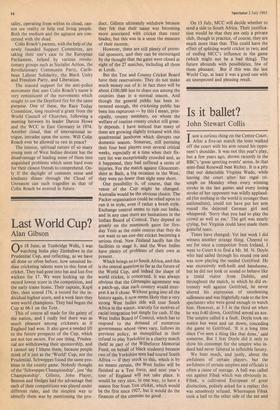Last World Cup?
Alan Gibson
O18 June, at Tunbridge Wells, I was 'L./watching India play Zimbabwe in the Prudential Cup, and reflecting, as we have all done so often before, how unsuited In- dian cricketing talents were to this form of cricket. They had gone into bat and lost five wickets for 17. We were looking up the record lowest score in the competition, and the early trains home. Their captain, Kapil Dev, then scored 174, a record for the in- dividual highest score, and a week later they were world champions. They had begun the Cup at 66-1 on the Tote.
This of course all made for the gaiety of the nation, and I really feel there was as much pleasure among cricketers as if England had won. It also gave a needed lift to the future prospects of the Cup, which are not too secure. For one thing, Pruden- tial are withdrawing their sponsorship, and I cannot say I blame them, because people think of it just as the 'World' Cup, not the Prudential. Schweppes found the same pro- blem in the county game. Nobody thought of the 'Schweppes Championship', just 'the Championship'. Gillette, John Player, Benson and Hedges had the advantage that each of their competitions was played under different rules, and the simplest way to identify them was by mentioning the pro-
duct. Gillette ultimately withdrew because they felt that their name was becoming more associated with cricket than razor blades, but this was in a sense the measure of their success.
However, there are still plenty of poten- tial sponsors, and they can be encouraged by the thought that the gates were closed at eight of the 27 matches, including all three at Lords.
But the Test and County Cricket Board have their reservations. They do not make much money out of it: in fact there will be about £100,000 less to share out among the counties than in a normal season. And though the general public has been in- terested enough, the cricketing public has been less rapturous — by this I mean, prin- cipally, county members, on whom the welfare of routine county cricket still great- ly depends. I have noticed that many of them are growing slightly irritated with this quadrennial jamboree which disrupts our domestic season. Somerset, still pursuing their four best players over several critical weeks, especially at a time when their fix- ture list was exceptionally crowded and, as it happened, they had suffered a series of injuries. For the match against Gloucester- shire at Bath, a big occasion in the West, they were no fewer than eight men short.
One possibility is, of course, that the venue of the Cup might be changed. Australia would be the obvious choice. The Packer organisation could be relied upon to run it in style, even if rather a brash style. Exchange control seems to rule out India, and in any case there are hesitations in the Indian Board of Control. They depend so greatly on the mammoth gates for five- day Tests as the main centres that they do not want to see one-day cricket becoming a serious rival. New Zealand hardly has the facilities to stage it, and the West Indies have plenty of problems of their own at present.
Which brings us to South Africa, and this is the central question so far as the future of the World Cup, and indeed the shape of world cricket, is concerned. It was always obvious that the Gleneagles agreement was a patch-up, that each country would inter- pret it as it chose. Without going into all the history again, it now seems likely that a very strong West Indies side will tour South Africa in the winter, scarcely for motives of racial integration but simply for cash. If the West Indies Board of Control, which has to respond to the demand of numerous governments whose views vary, follows its previous policy, as exemplified in their refusal to play Yorkshire in a charity match (held as part of the Wilbeforce Memorial Fund, on behalf of black students) because two of the Yorkshire men had toured South Africa — if they stuck to this, which is by no means certain, the West Indies will be finished as a Test force, and next year's tour of England will not take place. It would be very nice, in one way, to have a season free from Test cricket, which would be the first since 1927, but it would do the finances of the counties no good. On 13 July, MCC will decide whether to send a side to South Africa. Their justifica- tion would be that they are only a private club, though in practice, of course, they are much more than that. This could have the effect of splitting world cricket in two; and of ending MCC's influence in the game (which might not be a bad thing). The future abounds with possibilities, few of them pleasant. But if this was the last World Cup, at least it was a good one with an unexpected and pleasing result.






































 Previous page
Previous page